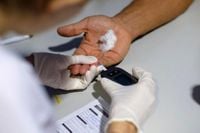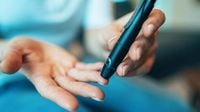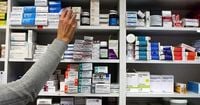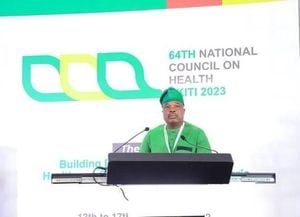At least 55,000 people in England are being called back for new blood tests after a widespread machine error led to inaccurate diabetes diagnoses, according to a BBC investigation and corroborated by NHS England. The problem centers on machines manufactured by Trinity Biotech, a US and Ireland-based company, which were used in 16 NHS hospital trusts across the country to perform the haemoglobin A1C test—a standard procedure for diagnosing and monitoring type 2 diabetes. The fallout from these errors has left thousands of patients, some of whom were wrongly prescribed medication, facing uncertainty and frustration as the health service scrambles to rectify the situation.
The issue first came to light in April 2024 when the Medicines and Healthcare products Regulatory Agency (MHRA) received reports of a positive bias in test results produced by the Trinity Biotech machines. This bias meant that some patients were given higher-than-accurate blood sugar readings, leading to misdiagnoses of type 2 diabetes or pre-diabetes. The BBC initially reported in September 2024 that 11,000 patients at Luton and Dunstable Hospital would need to be re-tested. As further investigations unfolded, NHS England revealed that the scope was much broader, with at least 55,000 patients potentially affected nationwide.
For patients like Vicky Davies, 36, from Kingston upon Hull, the consequences have been life-altering. Davies was diagnosed with type 2 diabetes in October 2024 and prescribed what she described as the maximum dose of metformin, a common diabetes medication. She followed her doctor’s advice, attended eye screenings, and tried to lose weight. But in April 2025, after a routine three-month review, she was told she was not diabetic—a result she initially attributed to the medication’s effectiveness. Only later did she learn that her diagnosis may have been incorrect due to faulty test results, and she was advised to stop the medication immediately. The months on metformin left her with stomach issues and dizziness, not to mention significant stress and time off work. “It’s had a huge effect on my life. Since the diagnosis I have suffered with stress and had to take time off work to attend appointments. I’ve complained to my GP, but I didn’t really get an apology. I’m just so angry,” Davies told BBC News. Her GP practice explained in a letter that they were unaware of the laboratory problems and worked with the information available at the time.
The haemoglobin A1C test, which measures average blood sugar levels over the previous three months, is a cornerstone in diagnosing and managing type 2 diabetes. According to The Independent, concerns about the accuracy of these tests were first officially raised in April 2024. The MHRA’s subsequent investigation confirmed a positive bias in the Trinity Biotech machines, which could lead to inflated blood sugar readings and, consequently, unnecessary diagnoses and prescriptions.
The impact of these errors has been significant. NHS England reported that type 2 diabetes diagnoses rose by 10,000 in 2024, a 4% increase over expected numbers. While the majority of the 5.8 million people living with diabetes in the UK have type 2 diabetes, the spike in diagnoses raised red flags among clinicians and regulators alike. The BBC notes that less than 10% of NHS laboratories were affected, but the machines’ reach was still broad enough to necessitate a nationwide recall of patients for repeat testing.
For some, the repercussions went beyond inconvenience. Patients wrongly diagnosed with type 2 diabetes were sometimes prescribed metformin or other medications they did not need. Metformin, while generally safe, can cause side effects such as gastrointestinal distress and dizziness, as Davies experienced firsthand. NHS England has emphasized that, for most patients affected by these errors, the clinical risk of harm is low. Dr. Clare Hambling, NHS England’s national clinical director for diabetes, reassured patients: “Being potentially misdiagnosed with any long-term condition, such as type 2 diabetes, is understandably worrying, however the clinical risk of harm to patients following this issue is low.”
The NHS has moved quickly to address the problem. All affected hospital trusts have either replaced the faulty machines or recalibrated them according to MHRA guidance issued in July 2025. Anyone requiring a repeat test will be contacted directly by their GP or local hospital. NHS trusts, including those in Hull, Scarborough, York, Luton, Bedfordshire, County Durham, Darlington, and Barking, Havering and Redbridge, have begun reaching out to patients to arrange new blood tests and offer support.
Trinity Biotech, for its part, has acknowledged the problem and said it is working closely with the MHRA to resolve the issue. The company has issued three Field Safety Notices in 2024 to all UK users, warning of the potential for positive bias and reiterating the importance of following manufacturer’s instructions for optimal operation. In a statement provided to the BBC, Trinity Biotech said: “The company has worked closely with the MHRA to resolve the issues experienced by some UK labs using the system.” The firm also noted that it had contacted all hospitals using its machines and provided detailed instructions on corrective actions.
Medical professionals have voiced their concerns about the broader impact of the incident. Professor Kamila Hawthorne, chair of the Royal College of GPs, told BBC News: “Errors can and do happen... the prospect of widespread technology failures like this will be of huge concern for all GPs, primarily because of the unnecessary distress, inconvenience and anxiety they can cause our patients.” She highlighted the additional workload for GPs and the need for support as they work to minimize the impact on patients.
For those affected, the NHS advises vigilance for symptoms of hypoglycaemia (such as shaking, sweating, confusion, or loss of consciousness) or hyperglycaemia (including excessive thirst, blurred vision, or recurrent infections) while on diabetes medication. Anyone experiencing these symptoms is urged to seek immediate medical attention. NHS England has also stressed that lifestyle advice and support programs will be offered to anyone who may have been wrongly diagnosed as a result of the machine errors.
As the NHS and Trinity Biotech work to ensure no further patients are affected, the incident serves as a stark reminder of the importance—and potential frailty—of technology in modern medicine. While the risk to patients is considered low, the emotional and practical toll for those caught in the error has been considerable. For Vicky Davies and thousands like her, the hope is that lessons learned will lead to greater safeguards and transparency in the future.






